Sustainable Euregio – 1st ARCHIREG Symposium
„Sustainable Euregio – Care, Ecology, Recycling “ ist der programmatische Titel des ersten ARCHIREG-Symposiums. ARCHIREG, ein föderatives Netzwerk der Architekturschulen von Aachen, Hasselt, Lüttich, Maastricht sowie der Akademie der Handwerkskammer Aachen, vereint Lehrende und Studierende der Rhein-Maas-Region in der Suche nach innovativen und ökologisch verträglichen Baupraktiken. Anlässlich des Gründungssymposiums werden Vertreter*innen der sechs kooperierenden Institutionen Ergebnisse aus Forschung und Lehre vorstellen. Ziel des Symposiums wird es sein, gemeinsame Antworten auf grenzübergreifende Herausforderungen zu formulieren. Das Symposium wird in der ehemaligen Klosteranlage Hoogcruts stattfinden. Hoogcruts ist zugleich Labor und Schaufenster; Werkstatt und Ausstellungsort. Aufgrund seiner geografischen Lage ist Hoogcruts der ideale Ort, um gemeinsam Impulse für die kommende Baukultur einer europäischen Region zu entwickeln, die sich durch natürliche und bauhistorische Vielfalt auszeichnet.
„Sustainable Euregio – Care, Ecology, Recycling“ is the progammatic title of the first ARCHIREG symposium. ARCHIREG, a federative network of the architecture schools of Aachen, Hasselt, Liège, Maastricht and the Academy of the Aachen Chamber of Crafts, unites teachers and students of the Rhine-Maas region in the search for innovative and ecologically sustainable building practices. On the occasion of the founding symposium, representatives of the six cooperating institutions will present innovative results from research and teaching. The aim of the symposium will be to formulate joint responses to cross-border challenges. The symposium will take place in the former Hoogcruts monastery. Hoogcruts is both laboratory and showcase; workshop and exhibition space. Due to its geographical location, Hoogcruts is the ideal place to jointly develop impulses for the coming building culture of a European region characterized by natural and architectural-historical diversity.
9:00-9:30 Registration
12.00-13:00 Exhibition Opening:
October 22, 2021; afternoon session
Panel 2. 14:30-16:00
16:40-17:00 Coffee break
17:00-18:00 Keynote lecture:
19:00 Dinner
October 23, 2021; morning session
Panel 3. 10:00-11:30
12:00-14:00 Lunch break
October 23, 2021; afternoon session
Closing panel.14:00-16:00
Moderator: Carolin Stapenhorst (FH Aachen)
Report of the symposium
First panel
The first panel introduced issues of cooperation and reflections upon climate and landscape. Lies-Marie Hoffmann from the Academy of the Aachen Chamber of Crafts presented the paper: “Reflections on Travel and Journey. An interdisciplinary exhibition project with Ludwig Forum Aachen, Academy for Design & Crafts and Ahoi-Gruppe Aachen.” It concerned an interdisciplinary cooperation between second semester students of the Academy and the Ahoi-Gruppe, an Aachen-based collective of citizens and refugees. The exhibition displayed the negative effects of “Travel and Journey” on climate and landscape with the installation of a concrete wall which symbolized human interventions in nature.Learning through making represents an opportunity to research and experiment with different methods of construction and materials. To this extent, Bernadette Heiermann presented several outcomes of her design-build studio at the RWTH Aachen University with a paper entitled: “Hands on. Learning through making.” She attempted at strengthening the practical side of architectural education by providing students the possibility to participate, design and develop a real design-build project. The lecture presented a wide range of research and teaching initiatives developed in collaboration with communities in different African contexts.The ensuing discussion and Q&A, moderated by Axel Sowa, focused on issues of experimentation and mutual collaboration among diverse cultures, communities, and professional groups.
Opening Exhibition
Projects from students of RWTH Aachen and FH Erfurt were shown in the exhibition “Sustainable Hoogcruts. The Future of a European Region” curated by Elena Wittbusch and Ramona Schaefer (RWTH Aachen). The exhibition displayed visions and design proposals for Hoogcruts that resulted from the Summer Academy 2021 held in Hoogcruts.Together with the foundation, we would like to further develop the monastery in the sense of a thinking and future workshop. Within the protection of the monastery walls, we can think together about the life of tomorrow. How will we eat, live and build in the future? What qualities of life are desirable for us? How can we prepare ourselves in everyday life for future ecological and economic crises? What social and technical innovations could help us meet future challenges?
The results you can check out on our website feed here.
Second Panel
A platform for experimentation with reused and upcycled materials might provide a true support to build sustainable and ecologically in the region. This hypothesis concerned a paper presented by Anke Fissabre and Evelin Rottke in collaboration with a group of master students at the FH Aachen: Florian Dittmann, Moran Dorner, Sebastian Peters. The paper presented the results of a research-teaching project on existing timber construction with reused and upcycled materials, such as one-way-pallets. It highlighted the idea of an Euregional building material exchange network based in Hoogcruts, also as a meeting place for collaborative exchanges among students, academics and professionals of the region.Understanding a place by perceiving and examining its distinct layers, means to overcome the reproduction of physical reality. This hypothesis concerned the paper entitled “Place and sustainability” gave by Remy Kroese, from the Maastricht Institute of Arts. It presented the results of teaching initiatives held at the Institute as well as works developed by the research practice “Dear Hunter.” Kroese provided examples of hand drawn maps in comparison to contemporary digital maps (i.e. Google maps) in order to frame the innovative disciplinary domain of ‘Cartopology.’ Maps can do more than just reproducing a place and can empower the narrative features of cartography.The discussion that followed, moderated by Andrea Alberto Dutto (RWTH Aachen University) concerned the relationship between architecture and society, with a focus on the negotiations between architects and clients. Changing perspectives in the processes of building and architecture was another subject of discussion.The first day of the Symposium was concluded with the keynote lecture gave by Laurens Bekemans, architect, and co-founder of the Brussels-based office BC architects. Bekemans described his work as an “act of building, which in its projects seeks to create a local network consisting of actors with different backgrounds and skills, allowing the use of different materials and technologies.” After describing the first built project of BC Architects in Burundi (Africa) in 2011, Bekemans explained the establishment of BC Materials and BC studies, as a hybrid practice led by the idea of using local and nearby building materials, turned from an initial economic use into an ongoing ecological concept.In the subsequent discussion, led by Axel Sowa, Laurens Bekemanns called for a stronger focus on customers’ wishes and adaptation to regional resources in the 21st century. Bekemans argued that growth ought to be defined as a transfer of knowledge to decentralize crafts and local labours rather than a general trend related to economic growth. He stressed the need to change the ordinary way of building towards an idea of ‘circular building’ and the possibility, as architects, to intervene as consultants, designers, and producers involved in all parts of a project .
Third Panel
Adapting visions to reality, as well as rethinking and redesigning the built environment to make it more regenerative and distributive can represent the true way towards sustainability. The first paper of the third panel entitled “Reflection on Building Beyond Borders” presented by Griet Verbeeck provided insights about the initiatives developed by the Sustainabilty Research and Education Team at Hasselt University. Verbeeck presented the platform “Building Beyond Borders” which tries to link students and researchers together with communities and local stakeholders. She also introduced several design studios that focused on energy sufficiency/efficiency, circular reuse, renovation of social housing, as well as on-site initiatives and global exchanges among students. The paper highlighted also the relevance of framing and defining global challenges by means of long-term relationships with local communities.How to manage resources properly? How to involve users in the design process? In his paper, Jean-Philippe Possoz introduced his academic work at the University of Liège Faculty of Architecture, where he is engaged in teaching studios operating on new ways of developing design procedures by facing social and economic issues. Drawing upon the real-lab studio “Faire (en) Commun”, he illustrated the design problem as an experimental experience through which students are able to situate themselves and experiment with different materials. Moreover, he highlighted three interrelated challenges: collaborative design, user-centered design, and media-centered design.The discussion, moderated by Axel Sowa, provided further insights into experimentation and the importance of teaching students ‘how-to-learn independently’ during their own hands-on projects, as well as the need to develop their understandings of the client’s needs. The reality check method served as a basis for testing the feasibility and a constant re-setting of goals as an important part of the process.
Roundtabel discussionCarolin Stapenhorst introduced the roundtable discussion of the 1st ARCHIREG Symposium and suggested a list of keywords. Participants to the roundtable provided reflections and proposals for a cross border cooperation based in Hoogcruts. A written wishlist highlighted the overall objective of creating a network aimed at collective actions leading to an innovative environment of learning as well as a shared Euregio meeting point.
The symposium represents an important starting point for more interregional exchange and discussions. Outstanding contributions on approaches of practicing and teaching, about innovative and ecologically sustainable building practices, provided a true cooperative ground for further institutional exchanges.
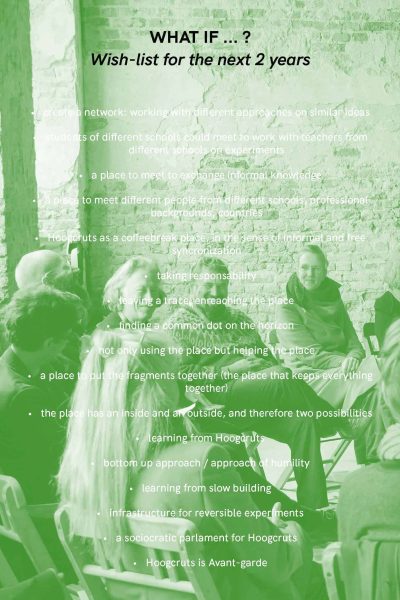
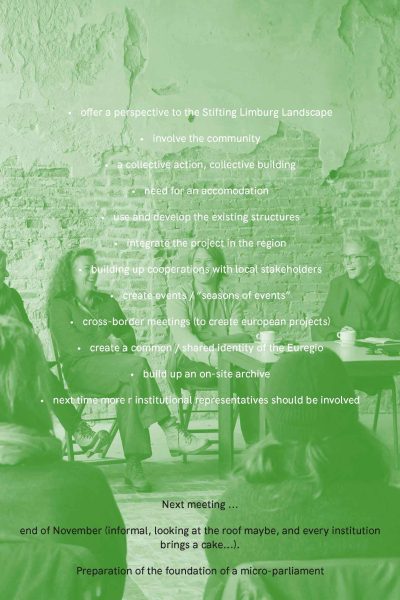
Symposium-Adresse:
Klooster Hoogcruts
Hoogcruts 47
6255 NS Noorbeek (Niederlande)
Registrierung unter dem folgenden Link: *
www.registrierung_symposium.de
* Aufgrund der Einschränkungen, die sich aus der Eindämmung der Covid-19-Pandemie ergeben, ist die Zimmerkapazität begrenzt. Die Teilnahme am Symposium ist vorbehaltlich der Verfügbarkeit auf die Personen beschränkt, die sich anmelden.

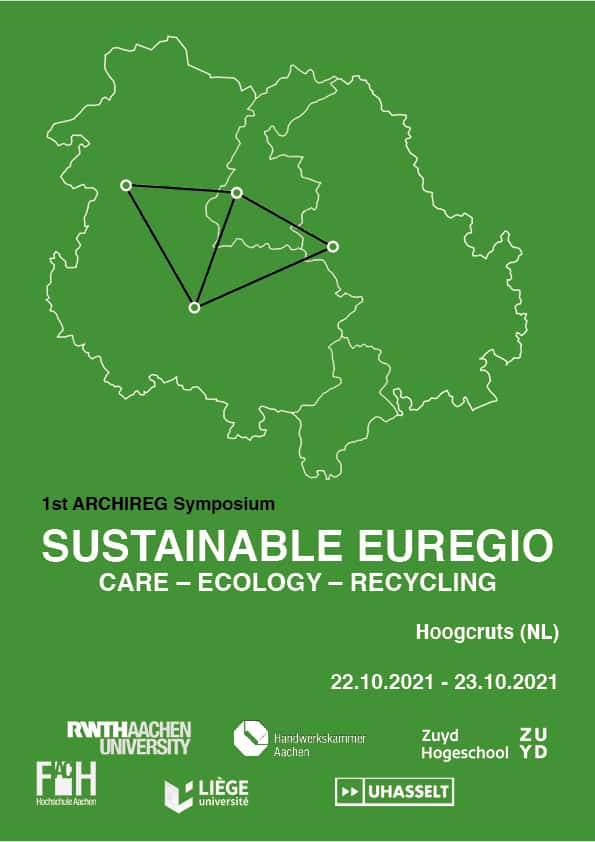
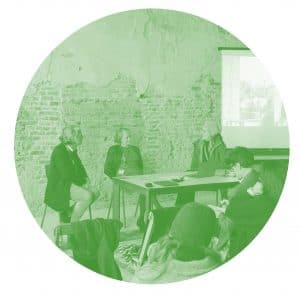 First panel
First panel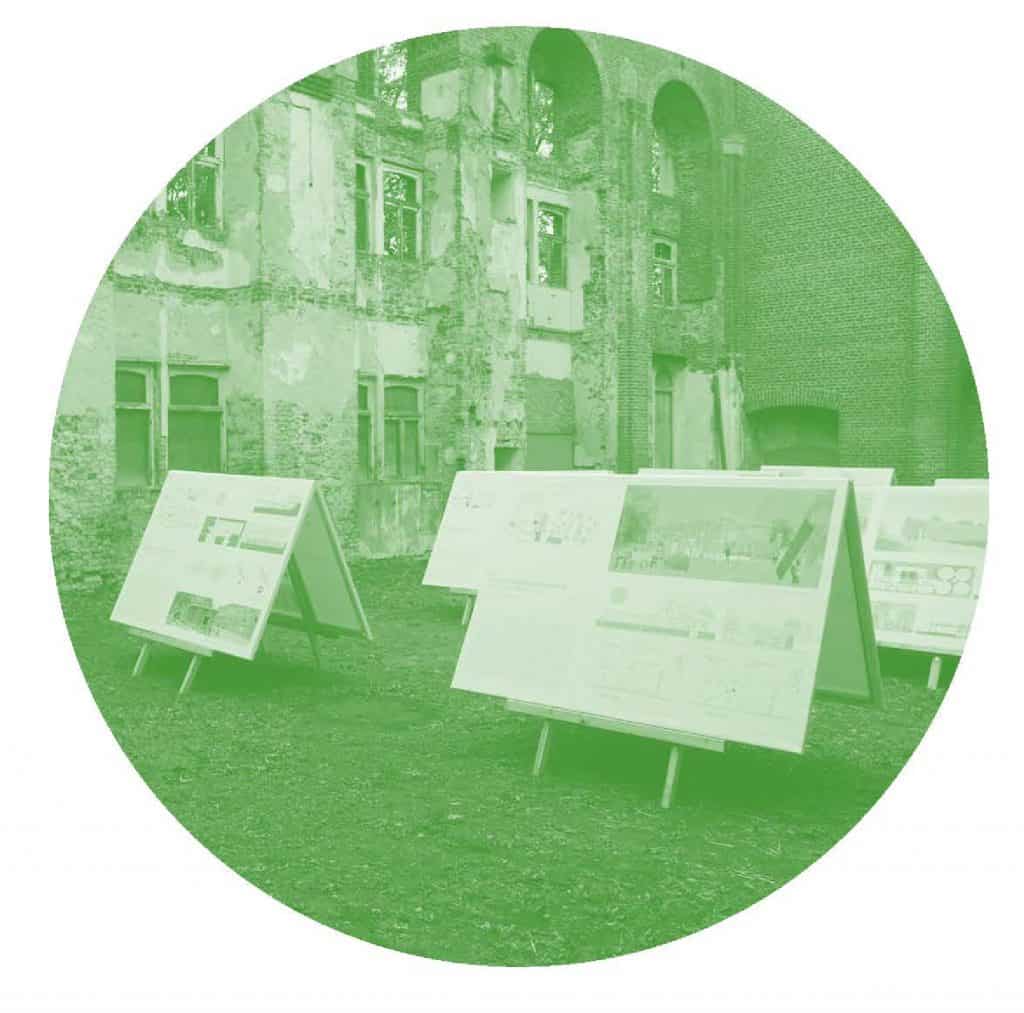 Opening Exhibition
Opening Exhibition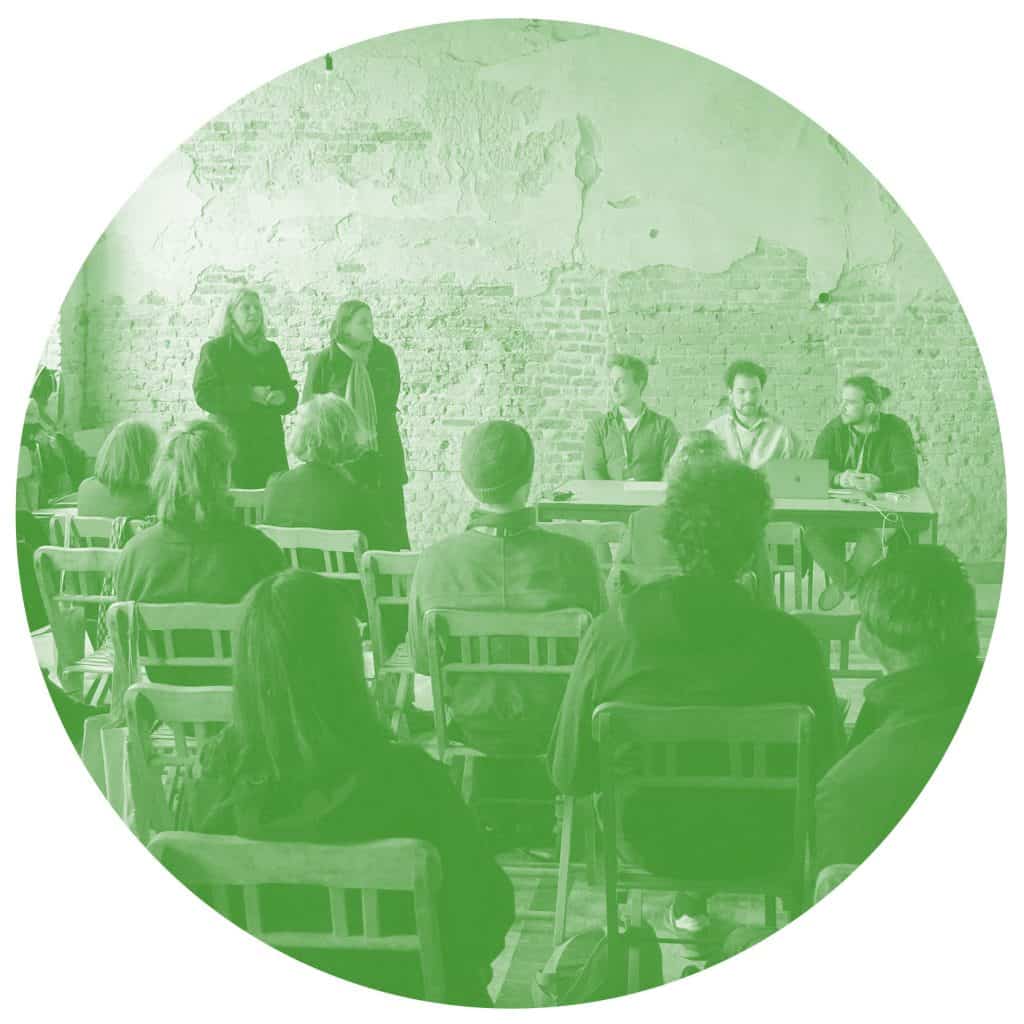 Second Panel
Second Panel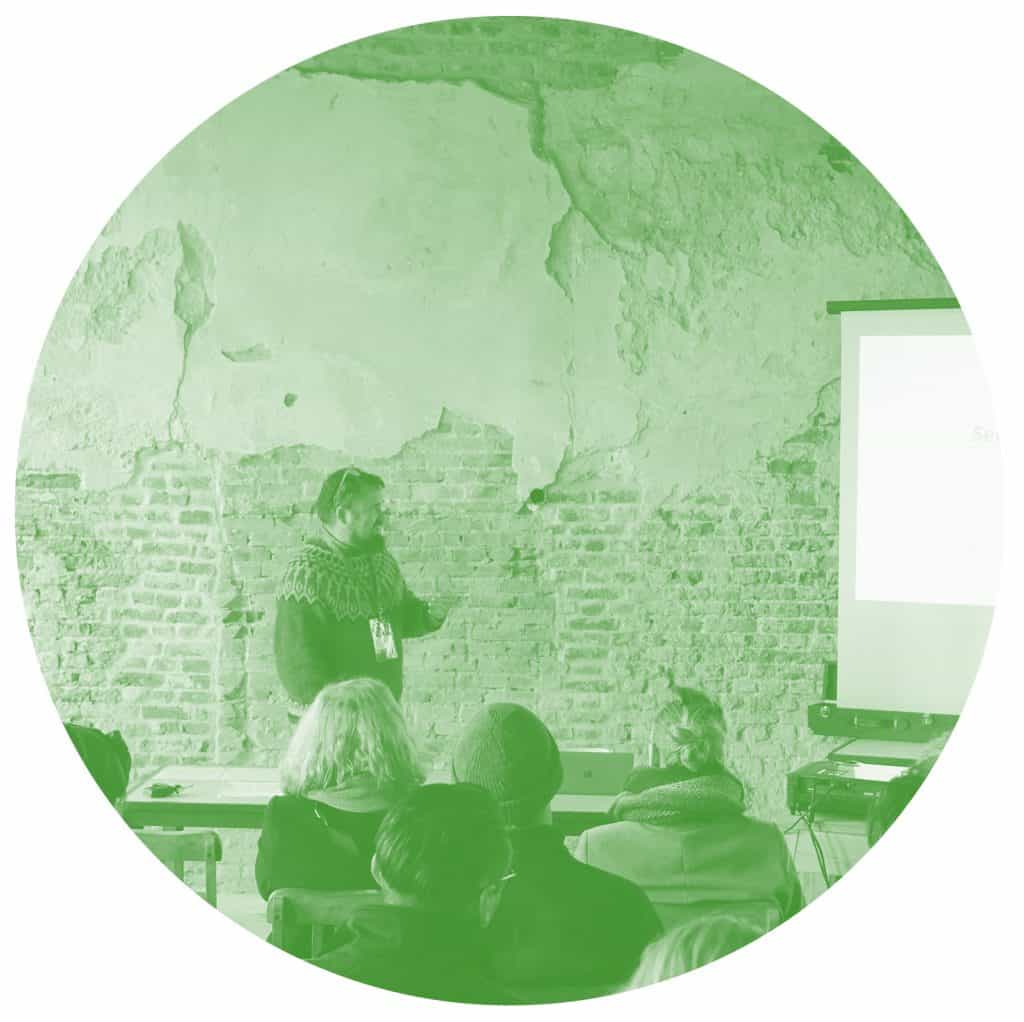 Third Panel
Third Panel